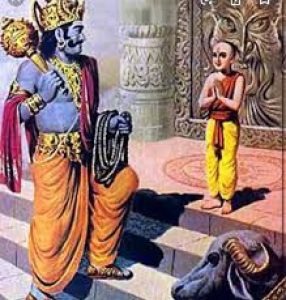Dennis made the following observations in a Comment at another thread @ 17:52 on Dec 23, 2020.
Quote:
You have also misunderstood Shankara’s commentary on Brihadaranyaka Upanishad 2.4.13. What it is saying is that when the body-mind of a j~nAnI dies, the chidAbhAsa consciousness dies with it, since there is no longer a mind to reflect the ‘original’ Consciousness. It does not say anything at all about the world disappearing or about the individual j~nAnI in any way disappearing prior to death of the body. The chidAbhAsa for the j~nAnI will continue until death. The world will continue to be seen by that j~nAnI even though it is now known to be mithyA.
Quote ends.
I am afraid that the view expressed by Dennis above lacks shruti and bhAShya support. Perhaps, it resembles the confusion that Maitreyi had when she listened to her husband, Sage Yajnavalkya, at 2.4.12, brihadAraNyaka. Continue reading

 On the insistent questioning of the highly determined Naciketas, Lord Yama had no alternative but to reveal the secret code to ending the transient mortal world and realizing the “immortality” that one actually and already is. It is not some thing new that one acquires. It is prAptasya prAptiH (
On the insistent questioning of the highly determined Naciketas, Lord Yama had no alternative but to reveal the secret code to ending the transient mortal world and realizing the “immortality” that one actually and already is. It is not some thing new that one acquires. It is prAptasya prAptiH (